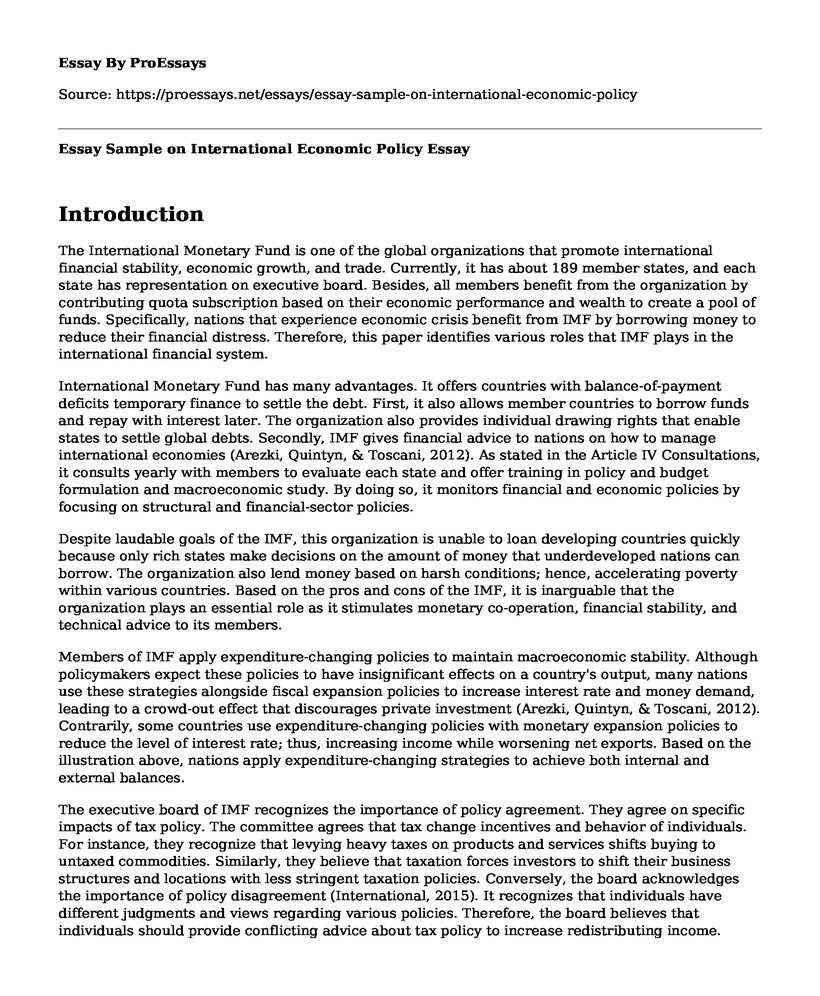Introduction
The International Monetary Fund is one of the global organizations that promote international financial stability, economic growth, and trade. Currently, it has about 189 member states, and each state has representation on executive board. Besides, all members benefit from the organization by contributing quota subscription based on their economic performance and wealth to create a pool of funds. Specifically, nations that experience economic crisis benefit from IMF by borrowing money to reduce their financial distress. Therefore, this paper identifies various roles that IMF plays in the international financial system.
International Monetary Fund has many advantages. It offers countries with balance-of-payment deficits temporary finance to settle the debt. First, it also allows member countries to borrow funds and repay with interest later. The organization also provides individual drawing rights that enable states to settle global debts. Secondly, IMF gives financial advice to nations on how to manage international economies (Arezki, Quintyn, & Toscani, 2012). As stated in the Article IV Consultations, it consults yearly with members to evaluate each state and offer training in policy and budget formulation and macroeconomic study. By doing so, it monitors financial and economic policies by focusing on structural and financial-sector policies.
Despite laudable goals of the IMF, this organization is unable to loan developing countries quickly because only rich states make decisions on the amount of money that underdeveloped nations can borrow. The organization also lend money based on harsh conditions; hence, accelerating poverty within various countries. Based on the pros and cons of the IMF, it is inarguable that the organization plays an essential role as it stimulates monetary co-operation, financial stability, and technical advice to its members.
Members of IMF apply expenditure-changing policies to maintain macroeconomic stability. Although policymakers expect these policies to have insignificant effects on a country's output, many nations use these strategies alongside fiscal expansion policies to increase interest rate and money demand, leading to a crowd-out effect that discourages private investment (Arezki, Quintyn, & Toscani, 2012). Contrarily, some countries use expenditure-changing policies with monetary expansion policies to reduce the level of interest rate; thus, increasing income while worsening net exports. Based on the illustration above, nations apply expenditure-changing strategies to achieve both internal and external balances.
The executive board of IMF recognizes the importance of policy agreement. They agree on specific impacts of tax policy. The committee agrees that tax change incentives and behavior of individuals. For instance, they recognize that levying heavy taxes on products and services shifts buying to untaxed commodities. Similarly, they believe that taxation forces investors to shift their business structures and locations with less stringent taxation policies. Conversely, the board acknowledges the importance of policy disagreement (International, 2015). It recognizes that individuals have different judgments and views regarding various policies. Therefore, the board believes that individuals should provide conflicting advice about tax policy to increase redistributing income.
International economic policies involve many tools. Firstly, governments use tariffs on imports to make local goods and services competitive. They introduce taxes to restrict and reduce the importation of particular products from specific countries. Secondly, states apply exchange rate as an essential tool of international economic policy (International, 2015). They manipulate exchange rate by selling or purchasing currencies on forex markets. If they want to raise the value of their domestic currency, they buy local currency, and the reverse is true.
Conclusion
In summary, the International Monetary Fund plays a significant role in the monetary system because it improves employment, economic development, financial stability, and international trade. As discussed earlier, it also enables deficit countries to borrow money and settle the debt. It is also important to acknowledge that expenditure-changing policies, policy agreement, and policy disagreement are essential elements of the financial system. Further, the management of IMF should implement exchange rate and tariff policies to raise the value of currencies and restrict imports respectively.
References
Arezki, R., Quintyn, M., & Toscani, F. G. (2012). Structural reforms, IMF programs and capacity building: An empirical investigation. IMF Working Papers, 12(232), 1. Retrieved from https://ebookcentral.proquest.comInternational, M. F. (2015). IMF Financial Operations 2015. Retrieved from https://ebookcentral.proquest.com
Cite this page
Essay Sample on International Economic Policy. (2022, Nov 11). Retrieved from https://proessays.net/essays/essay-sample-on-international-economic-policy
If you are the original author of this essay and no longer wish to have it published on the ProEssays website, please click below to request its removal:
- Capitalism Essay Example
- Essay Sample on Becoming-Endriago: Gore Capitalism's New Subjects
- Immigration and Labor Markets Debate - Essay Sample
- Employee Stress: Breaking the Cycle of Negativity and Low Productivity - Research Paper
- Essay on Comparing Microeconomic Effects of the Great Depression and Current Economic Crisis
- Essay Sample on Global Strategies: Enhancing Competitive Advantage Across Borders
- The Negative Impact of Technology: Unemployment, Laziness, Environmental Issues, and Health Concerns







